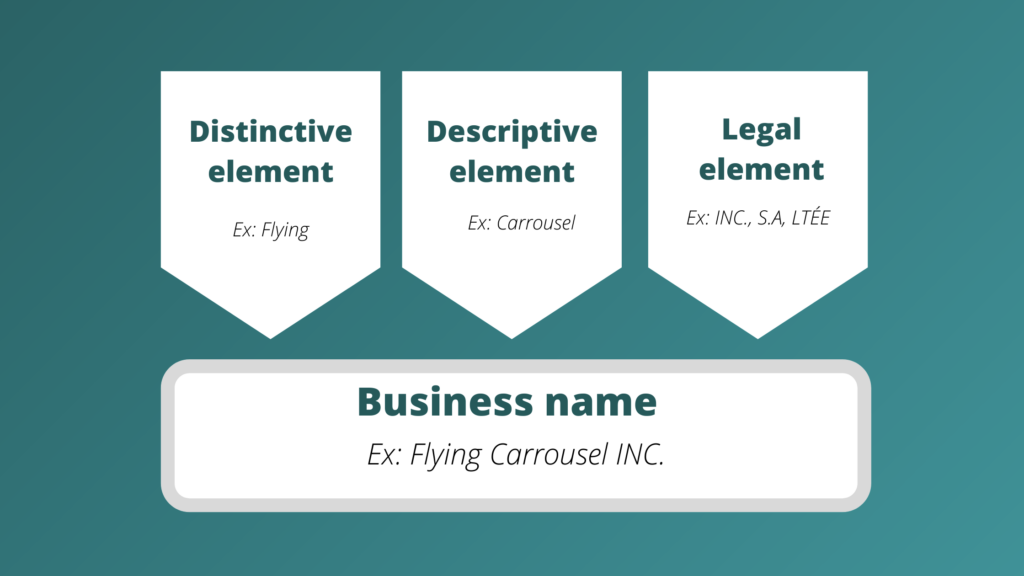Our article on the differences between federal and provincial incorporation in Ontario in the previous article briefly discussed the importance of the business name in choosing the governing law of your corporation, either under the Ontario Business Corporations Act (hereinafter “OBCA”) or the Canada Business Corporations Act (hereinafter “CBCA”).
In the same vein, this article outlines the general practical and legal considerations you may keep in mind when choosing your business name under the OBCA.
Before registering your business name in Ontario
From a practical standpoint, choosing the right name for your corporation in Ontario proves to be critical in mainstreaming the identity of your corporation, and promoting its products and services. Not only it is a legal requirement but having a different business name from the ones already operating allows your corporation to brand itself in the mind of prospective customers and to distinguish itself from competitors.
To help you chose the right name for your business in Ontario and to avoid any confusion with the name of already-established businesses, you can start digging here:
- Google: it is the easiest, quickest, and cheapest way to verify if another corporation is using an identical or similar name to the one that you want to use!
- GoDaddy: If you are thinking of having an official website for your business, you may want to verify if there are available domain names matching your business name. Note that there are multiple Top-Level Domains that can be used to set up your website.
- Ontario Public Record: The Central Production and Verification Services Branch of Ontario (hereinafter the “Branch”) provides information about incorporated and unincorporated business names that are registered and operating in Ontario. As a rule of thumb, it is recommended to conduct a preliminary research of your proposed name to verify whether it is similar to the name of another business.
- Canadian Trademarks Database: Even if your name is not used by other businesses, you should verify that it is not registered nor protected by the Trademark Act. To do so, you can conduct a search in the Canadian Trademarks Database.
- NUANS research and report: Lastly, you may mandate a NUANS search to examine all corporate, business and trade names across Ontario. This is the most comprehensive research that you can conduct to ensure that your proposed name does not infringe on another’s.
A NUANS research generates a corporate report that reserves your proposed name in its database for 90 days. This report must to be submitted with the filling of your incorporation. However, this does not guarantee that it will be approved by the Branch.
From a legal standpoint, your proposed business name must respect multiple conditions and rules that will be highlighted in the following sections.
Legal conditions that your business name must respect in Ontario

When incorporating under the Ontario Business Corporations Act (OBCA), you have 3 business name options:
- A numerical name: that is a 9 numbers name figure followed by the legal element of your corporation, for example “INC.” (i.e. 123 456 789 INC.)
- A corporate name: that is a name provided in the articles of incorporation of your corporation.
- An assumed name: that is a name under which your corporation conducts its business which is not the corporate name as provided in the articles of incorporation. Commonly, it is referred to as the “doing business” name, and is an additional name to the numerical or corporate name.
Numerical name

If you decide to incorporate your business using a numerical name in Ontario, you do not have to conduct a NUANS search and to submit a report. In fact, the Branch assigns you a number followed by the legal element of your choice (i.e. “INC.”).
Here are your options for the legal element:
- xxx xxx xxx Limited or Ltd.
- xxx xxx xxx Limitée or Ltée. (French form)
- xxx xxx xxx Incorporated or Inc.
- xxx xxx xxx Incorporée or Inc. (French form)
- xxx xxx xxx Corporation or Corp.
Your numerical name will be featured on all of your legal and Branch’s documents. If your corporation does not require a corporate name, having a numerical name may be your easiest and cheapest option.
The corporate name in Ontario

If you decide to incorporate your business using a corporate name in Ontario, you must ensure to respect all the requirements at law, and to fill a NUANS report. Note that a corporate name is different and should not be confused with a trademark.
Typically, a corporate name consists of 3 elements:
- One that is distinctive – i.e. Flying
- One that is descriptive, and – i.e. Carrousel
- One that is legal – INC.; CORP.; LTD.;

You can use an English and/or French form, or a combination of both languages for your descriptive and distinctive elements:
- English form only – i.e. Flying Carrousel INC.
- French form only – i.e. Caroussel Volant INC.
- English and French form combined – i.e. Flying Caroussel CORP.
- English and French form that are the equivalent and used separately – i.e. Flying Carrousel LTD./Caroussel Volant LTÉE.
When choosing your descriptive and distinctive elements, the general rule provides that your corporate name must not contain a word or an expression that is confusingly similar or identical to a known name, reserved name or trademark of another business.
There are 3 exceptions to this general rule:
1st exception: a corporation may acquire a name that is identical to the name of another corporation that is not incorporated under the OBCA and has never operated or registered itself in Ontario.
2nd exception: a corporation may acquire a name that is identical to the name of another corporation that changed its corporate name or that was dissolved for more than 10 years.
3rd exception: a corporation may acquire a name that is identical to the name of another corporation if it meets the requirements of section 6(2) of Regulation 62 under the OBCA.
Furthermore, your corporate name should not be misleading; that means that the public should be confused with respect to the goods and services that your corporation provides. Also, all the conditions provided by Regulation 62, which prescribes a list of general and specific restrictions and prohibited usages, should be respected by your corporate name.
Note that, although your corporate name meets all of the above-mentioned criteria, it remains subject to an objection and hearing under section 12 of the OBCA, reason why a NUANS report is essential and mandatory. Such a report is required for any corporation, trust, association, partnership or sole proprietorship that wants to register under the OBCA.
The assumed name in Ontario

In addition to your numerical or corporate name, your corporation in Ontario may operate under an assumed name. The Business Names Act (hereinafter “BNA”) provides why and how to register an assumed name, and what requirements an assumed name must respect.
WHY SHOULD YOU REGISTER YOUR ASSUMED NAME ?
First, you want to avoid any legal penalties. Under the BNA, fines up to $25,000 can be sanctioned against corporations that fail to register or register misleading or false information with respect to their assumed name.
Second, you want to protect and enforce your rights against other corporations. Although the BNA does not prohibit the usage of identical names, it allows corporations to sue in damages to recover for their suffered loss, and for a court order cancelling the registration of the assumed name being the cause of action.
HOW DO YOU REGISTER YOUR ASSUMED NAME IN ONTARIO ?
Registration is subject to a service fee and is effective for a fixed period of 5 years. It is your corporation’s responsibility to renew the assumed name’s registration, to pay the renewal fees, and to maintain its information up to date. Note that certain changes to your corporation such as in its address or partners must be notified within 15 days of the occurred change, and that certain fees may apply.
Once you register your assumed name, a Master Business Licence will be issued. This licence serves as proof of registration and provides its expiry date, and the Business Identification Number (BIN). Note that the BIN is different from the business number (BN) provided by the Canada Revenue Agency for federal programs.
WHAT REQUIREMENTS SHOULD YOUR ASSUMED NAME RESPECT ?
First, your assumed name has to be different from your numerical or corporate name.
Second, your assumed name must be distinctive and must not be misleading or confusing in its description of the goods or services offered.
Third, your assumed name must not contain the legal element of your business (i.e. “INC.”).
Lastly, your assumed name must not present confusing similarities with that of another corporation. In the contrary, you expose yourself to a possible lawsuit under the BNA and the OBCA by other corporations.
Furthermore, the BNA provides general and specific restrictions, prohibited usages, and exceptions on assumed names prescribed by law. For a better understanding of the applicable law, do not hesitate to contact us using the chat room at the bottom right of your screen.
Conclusion
In conclusion, remember that:
- Choosing your business name in Ontario should take into account multiple practical and legal considerations that requires a sound and well-established legal strategy.
- You are not alone; Lexstart is here to help you choose a business name that suits your needs and that respects the law without compromising your budget by offering affordable and customized legal services.
We hope that this article shed further light onto the underlying factors to assess when choosing your business name in Ontario. For more information in regard to your business name or about the incorporation process, contact us.






